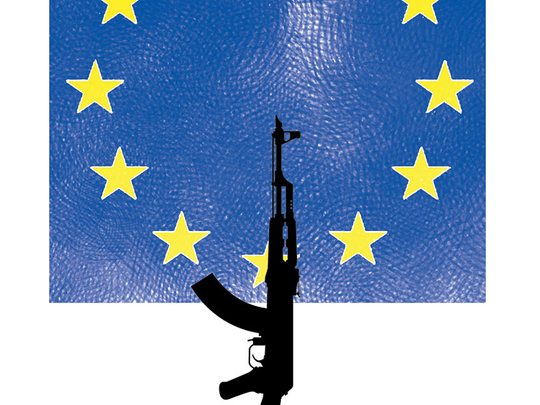
In his 1898 poem Waiting for the Barbarians, the Greek poet, C.P. Cavafy, describes a polity that invents or exaggerates mysterious foreign threats to prop up its decaying power structures. The listless ruling elites, hollow public ceremonies and pervasive forebodings of doom depicted in Cavafy’s masterwork should serve in 2016 as a wake-up call for Europe.
Whether it concerns terrorism, immigration, homegrown political extremism, the Eurozone’s unity, unemployment, lacklustre economic growth or even Europe’s military defences, national governments and the European Union (EU) apparatus in Brussels look increasingly as if they are not up to the numerous challenges bearing down simultaneously from every direction. This should worry not just Europeans but their friends and partners in the Americas and Asia.
The malaise goes much wider and deeper than the EU, which is not to blame for everything that happens or does not happen in Europe. It is partly a matter of Europe’s relative global decline, which makes it difficult to manage events even in its own neighbourhood. It is partly a matter of cultural, economic, political and technological change in western societies as a whole. This disrupts familiar patterns of life, undermines the trust of citizens in their rulers and weakens the ability of governments to act decisively.
Nonetheless, the EU is the focus of concern. Its inadequate responses to one crisis after another create the unfortunate impression that, despite being a club of affluent democracies, with 28 member states and more than 500 million inhabitants, the EU is doomed always to be less than the sum of its parts. Rousing appeals from political leaders for a more efficient and closely integrated EU — and there have been lots of them in 2015 — turn out too often to be mere lip service to an ideal.
The EU’s pitiful efforts at defence collaboration illustrate the problem. It was none other than Jean-Claude Juncker, the European Commission president, who said in October: “If I look at the common European defence policy, a bunch of chickens would be a more unified combat unit in contrast.”
This is not to say that the EU is on the brink of falling apart. As they demonstrated during the Eurozone crisis, and as they are demonstrating again in the refugee and migrant emergency, Europe’s leaders have a tried and tested method for coping with urgent problems. They find solutions that are temporary, barely satisfactory and designed chiefly to serve the purpose of somehow keeping the EU show on the road.
In this spirit they have arranged three hugely expensive financial rescues of Greece, but they have refused to grasp the nettle of a comprehensive write-off of Greek debt. They have created a semi-banking union which has common supervision and a common mechanism for winding up failed banks, but which lacks common deposit insurance. In both cases it is national political pressures, primarily in Germany, that are the obstacle.
Just as the Eurozone crisis split the currency union between northern and southern Europeans, so the refugee emergency is dividing the EU between its older western European member states and its newer central and eastern ones. The Schengen system of border-free travel, a cornerstone of EU integration, is already fragmenting along west-east lines. If the barriers that separated the two halves of Europe before 1989 are not to re-emerge, it will be essential that western Europeans resist the temptation of imagining that they would be better off in a union, as in the cold war era, of 15 or fewer nations.
To avert Schengen’s complete disintegration, the EU is pinning its hopes, and 3 billion euro (Dh11.98 billion) of its money, on Turkey to stem the tide of incoming war refugees and migrants from the Middle East, north Africa and beyond. The EU is also proposing to set up a powerful border and coastguard agency.
The most serious question for the EU in 2016 will be what consequences will follow if neither of these measures is effective, and if a European city suffers a terrorist rampage like the Paris attacks of November 13.
A related risk is that, despite the success of mainstream democratic parties in beating back the far-right National Front in France’s December 13 regional elections, right-wing populists will encroach more closely on the citadels of European power. Arguably, however, a more insidious threat to democracy comes from the willingness of respectable centre-right European politicians to borrow rhetoric and policies from their extremist rivals. This practice corrodes public discussion by promising simple solutions to complicated problems.
More than at any point since its creation in the 1957 Treaty of Rome, the EU appears vulnerable over the coming 12 to 24 months to a succession of dreadful blows and upsets.
All are potentially fatal to the EU’s unity — not least Britain’s referendum, due by the end of 2017, on whether to stay in the bloc — but not necessarily to the EU’s survival as such.
Like Cavafy’s imaginary state, or like the Holy Roman Empire, which lasted for 1,000 years before Napoleon put it out of its misery in 1806, the EU may not disintegrate but slip into a glacial decline, its political and bureaucratic elites continuing faithfully to observe the rites of a confederacy bereft of power and relevance. It is not an outcome that any European with a grain of common sense should wish for. But it is no longer inconceivable.
— Financial Times












